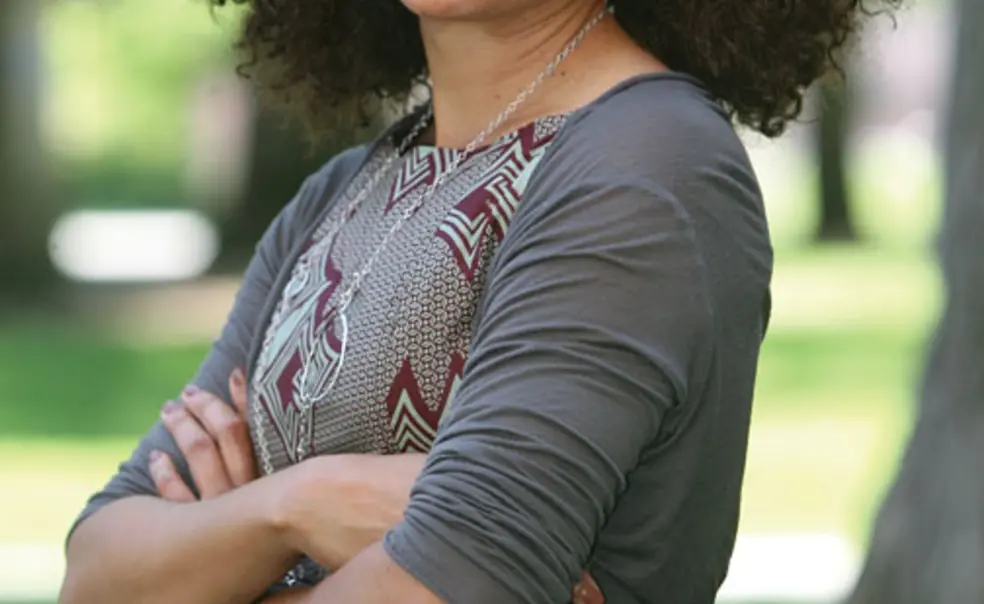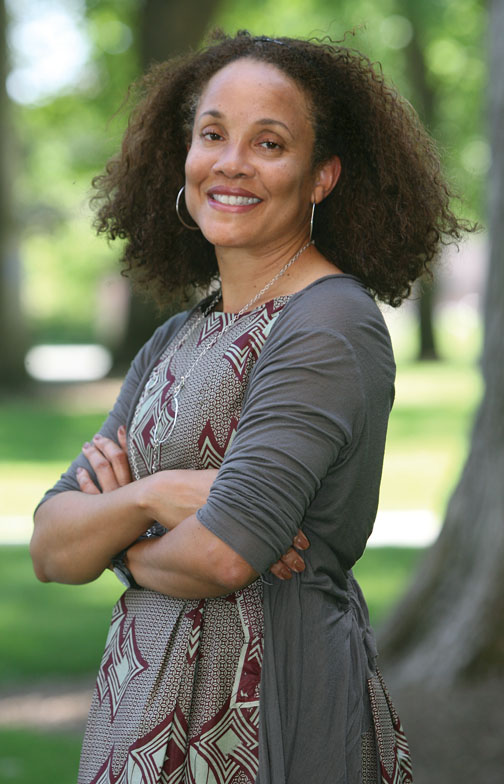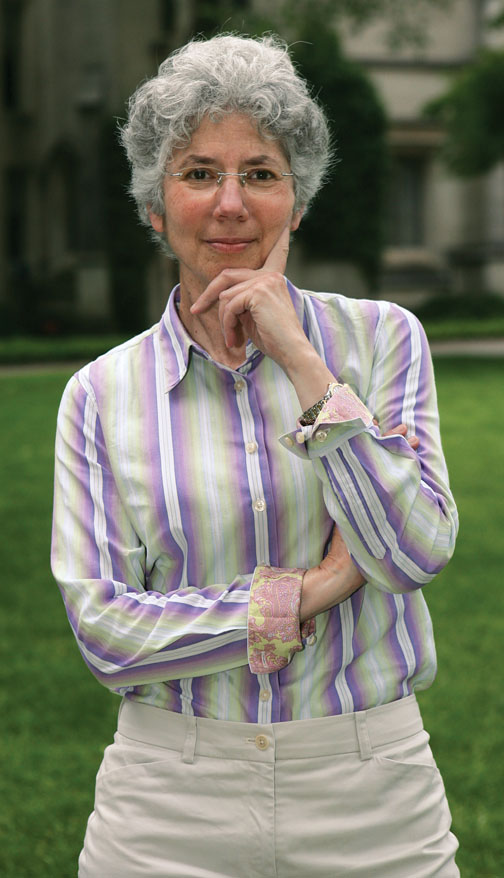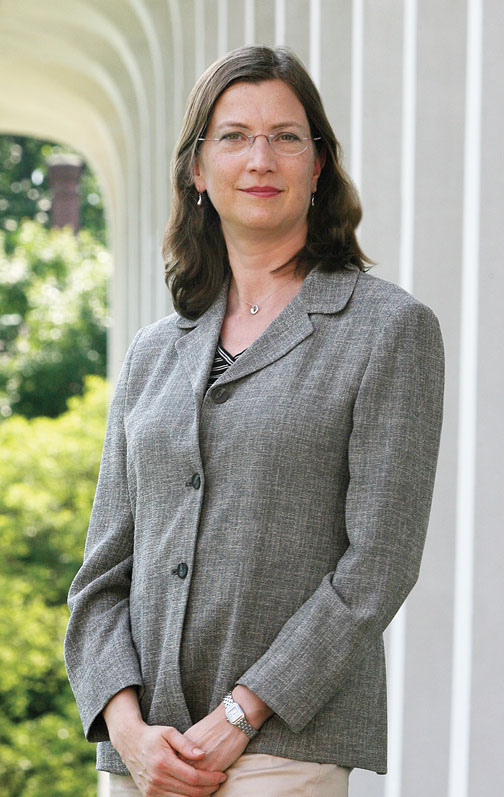Female professors study op-ed writing as path to higher profiles
The op-ed pages of the nation’s leading newspapers are dominated by the opinions of men, and women’s reluctance to promote themselves as experts may be a reason. A yearlong program at Princeton set out to change that.
Twenty-one female Princeton faculty and staff members have been working on the skills that will get them onto the opinion pages and, as a result, raise their profile among the nation’s thought leaders. Male bylines made up 84 percent of the columns by staff and guest columnists in The New York Times, The Washington Post, and The Wall Street Journal during a two-month period in 2011, according to the group Fairness and Accuracy in Reporting. Previous studies showed similar numbers.
The program, called Public Voices, was funded by eight academic departments, the dean of the faculty’s office, and President Tilghman’s office. Tilghman supported the program, she said, because “while the benefits of some [faculty] research may take decades or more to be realized, other work is of immediate relevance to issues of the day. It is our responsibility to see that our work is broadly published.”
Public Voices, which also focused on promoting the voices of minorities, offered three daylong workshops on crafting op-eds and making media appearances — new skills for academics who, despite impressive résumés, sometimes sell themselves short.
“We do these programs all over the country, and we consistently see women struggle to own their expertise,” said Courtney Martin, a seminar leader with the OpEd Project, the New York-based organization that runs the workshops, which have been held this year at Fordham, Stanford, and Yale.
When Martin began the first session at Princeton, she asked each participant to describe her expertise and credentials. Several women were hesitant to tout their accomplishments. Two had received major accolades — one won a MacArthur “genius grant,” the other contributed to the climate-change panel that won the Nobel Peace Prize with Al Gore in 2007 — “and neither of them mentioned it,” Martin said. “The culture has sent women the message to be humble. One of our OpEd Project koans is that self-abnegation taken too far is selfish. Withholding your good ideas from the world isn’t just humble, it’s selfish.”
Why did Denise Mauzerall, a professor of civil and environmental engineering who contributed to the Nobel Prize-winning climate-change panel, fail to mention this credential? “A couple thousand people were on the team, and it seemed like overreaching,” she said.
As a result of the program, more than 30 op-ed articles were published in the 2011–12 academic year by the Princeton participants in a variety of venues, from The New York Times (sociology professor Elizabeth Armstrong, on breastfeeding) and the website of CNN (Woodrow Wilson School administrator Leslie Gerwin, on flu pandemics) to the Public Broadcasting Service’s website (computer science professor Margaret Martonosi, on funding science and technology research).
The program works with opinion pieces because they often are a gateway to TV appearances, speaking engagements, research funding, and book deals. Noliwe Rooks, who was associate director of the Center for African American Studies until taking a position at Cornell July 1, was invited to speak to two audiences of educators after her op-eds on charter schools and diversity in schools appeared on the websites of Time and PBS.
But participants noted that some academics view writing for newspapers and blogs as drawing time and energy away from scholarly writing. Also, op-eds are far different than most academic writing, requiring snappy leads, brevity, and quick turnaround.
“As academics, we tend to wait until we’re absolutely sure of what we know,” said Tey Meadow, a sociologist who has a three-year postdoctoral fellowship at Princeton and published two opinion pieces — the first she has ever written — on reproductive health care and media coverage of suicide by gay and transgendered youth.
“Op-eds require an immediacy that feels risky to academics but ultimately is really important,” she said. Still, she makes sure to put her scholarly work first. Op-eds “don’t replace academic work, but they certainly complement it,” she said.
The op-ed form may not be suited to all scholars. Mauzerall, who studies the connections between air pollution and climate change, said she struggled to craft a piece that was snappy enough to get published but still scientifically accurate. “Making these two sides meet — technically correct and engaging with the public — is challenging,” she said. She still is working to craft a piece she is comfortable submitting.
Comparative literature professor April Alliston found the workshops helped her think more broadly about her expertise in 18th-century women’s literature. An opinion piece she co-authored for CNN’s website, headlined “‘Mommy porn’ novel has retro message,” explored the origins of the themes of Fifty Shades of Grey, a bestselling erotic novel. Alliston’s piece garnered 160 online comments and a rebuttal on the website of the British newspaper The Telegraph.
“Publishing an academic piece feels more like a drawing-room conversation,” she said. “This one feels like you’re getting up on your soapbox in the public square and letting people throw tomatoes at you.”
Still, Alliston was grateful to the program for “giving me the confidence to persist instead of giving up.” As for the negative comments, she said the program has a slogan to address those: “If you say something of consequence, there may be consequences.” Her addition: “Take it like a man.”
TERA HUNTER
Professor of history and African-American studies
Opinion article on The Huffington Post about the connections among marriage, race, and economics
What she learned: “How important it is for scholars to take big ideas and translate them into smaller, but still substantial, bits that can be compelling to lay readers.”
JILL DOLAN
English and theater professor; director, Program in Gender and Sexuality Studies
Opinion article on celebrity and sexuality on the AlterNet website
What she learned: “How important it is for women academics to learn how to speak to large public audiences. What we think and do and teach is too important to be seen as remote from people’s daily lives.”
DENISE MAUZERALL
Professor of civil and environmental engineering and public and international affairs
Working on an op-ed on sustainability
What she learned: “An op-ed must be written in a way that’s accessible to the public, but it is critical to maintain technical accuracy to preserve scientific credibility. Although op-eds can be important for educating the public, few scientists are willing to take the time and risk public disapprobation to do it.”















No responses yet